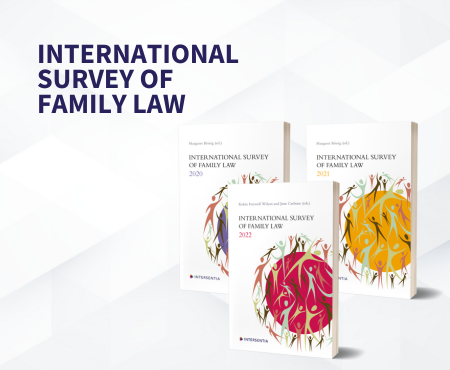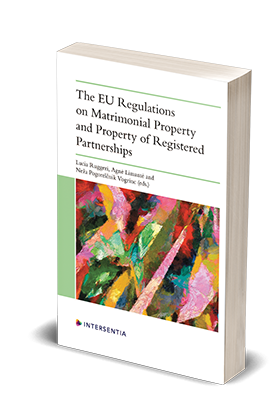| Interview |




Delving into the future of family law: an interview with Professors Robin Fretwell-Wilson and June Carbone, members of the academic committee the International Society of Family Law Conference and editors of the 2023 International Survey of Family Law
Our Publisher Francesca Ramadan interviews Professors Robin Fretwell-Wilson and June Carbone about the state and development of international family law, the Golden Jubilee of the International Society of Family Law and the upcoming new iteration of the International Survey of Family Law.
The 17th World Conference of the International Society of Family Law (ISFL) was an online event held during the pandemic at a time of crisis and change for both family law practitioners and the families they support. Now that we are all gathering in person after the pandemic for the 18th World Conference and to celebrate the Golden Jubilee of the ISFL, can you give us some insight into what has changed in the family law landscape in the years between these events? How has the COVID-19 pandemic affected the discipline of family law, and what kind of ramifications are we still seeing today? What changes—both positive and negative—have you both seen occur in the past few years?
Topmost in the United States is the overturning of nearly 50 years of access to abortion services and the foundational decision of Roe v. Wade. Changes in the United States are emblematic of the fragility of family law changes across the world, where we see both “progress” and retrenchment, fed by political polarisation. During COVID, many people were cut off from parents or other family living in assisted living or other facilities, and families were cut off from communities, losing important protections that come from being a part of the larger community. The next decade will be spent understanding what is lost when we are cut off from family, but also the role of law in protecting vulnerable persons from risks that arise within the family.
The theme of the 18th (Golden Jubilee) World Conference is “Rethinking Law’s Families & Family Law?”, which reflects the tension between the changing dynamics and definitions of what might constitute a family in our societies and the ways in which “the family” is conceived of and legislated in law and policymaking. Topics for this year include larger questions about what constitutes a parent, a partner or sibling. What impact can we expect these discussions to have on the future of family law?
We face ongoing evolution in the definition of who counts as a parent and what constitutes a family because of a global change in the relationship between work, family, and marriage. The universalisation of marriage as defining family ties in most countries reflected the assignment of control over wealth and income in accordance with patriarchal principles and the wholesale subordination of women. The post-industrial economy has created demand for women’s, as well as men's, market labour, while dramatically lowering the payoff for the type of labour that men have historically provided. This has produced a wholesale change in the relationship between couples, dismantling the patriarchal structures that compelled marriage and embracing a range of voluntary and egalitarian family arrangements that need not be permanent.
Recognising and managing these more diverse family forms poses unprecedented challenges for the legal system, as the new arrangements do not necessarily involve shared norms—not just between different groups in society, but between members of the new families that result from these arrangements. The legal system must seek predictability, security, and protection for family members' rights within the new arrangements. International discussion of the content of the new norms, the ways in which international human rights compels recognition of the families, and practical discussions of how to secure recognition across borders is essential to family strength and wellbeing.
On a related note, you are both participating in a session on translating scholarship into law and policy. Can you elaborate on what might be covered in this session and what lessons the audience may expect to learn?
Many academics want their research and scholarship to count in the world, but we are not often trained in how to make the translation from scholarship to policy and legislative interventions. This panel will discuss opportunities for influencing international accords, national policy through law reform bodies and initiatives for justice grounded in universities, opportunities to influence policy through commissions, and the formation of relationships to lawmakers and law-making bodies. These mechanisms are increasingly important as countries increasingly direct resources to universities based on the “impact” of their faculty’s work.
You are both editing the 2023 International Survey of Family Law. Can you tell us more about the contributions featured in this year’s iteration of the Survey, and what you are particularly excited about regarding this publication? In what ways do the topics covered explore the practice of family law in the future, and what can we learn from the reflections included?
We are excited to publish two back-to-back volumes to celebrate the Jubilee anniversary of the International Society of Family Law. The volumes will contain Reflections On 50 Years of the International Society of Family Law from members who have been part of the Society from its founding. In addition, the Survey will include 50-Year Retrospectives on Family Law, both global perspectives and country-specific developments across the last half century, as well as Developments in Family Law spanning the globe. We are still soliciting contributions by senior scholars, as well as mid- and early-career scholars, who are the future of family law in the next half century.
As we are celebrating the 18th Golden Jubilee World Conference in Antwerp, it would be great to highlight 2023 International Survey of Family Law’s Belgian contributors. Can you provide us with some highlights of what readers might expect from Aurélie Cassiers, Emilie Hermans and Géraldine Mathieu’s chapter 50 Years of Belgian Parentage Law: Time to Celebrate or Contemplate? and Nishat Hyder-Rahman, Elisabeth Alofs and Marco Giacalone’s contribution on Artificial Intelligence and Algorithms in Family (Patrimonial) Law?
The Belgian chapters provide particularly compelling accounts of the conference themes. 50 Years of Belgian Parentage Law by Professors Aurélie Cassiers, Emilie Hermans and Géraldine Mathieu recounts the transformation within Belgium of parentage law—from an almost exclusive reliance on marriage to define the biological and legal ties contributing to recognition of children's equal rights, to recognition of family relationships, irrespective of the marital status of their parents and, increasingly, irrespective of the biological circumstances of their birth. Belgian law has changed to recognise families created through use of artificial reproductive technologies and through the agreements of same-sex couples and other adults who establish a variety of families that may not necessarily involve either marriage or biological ties. At the centre of this transformation lies recognition of the best interest of the child as a guiding principle that requires recognition of the full range of family ties.
Artificial Intelligence and Algorithms in Family (Patrimonial) Law by Professors Nishat Hyder-Rahman, Elisabeth Alofs and Marco Giacalone examines the role of new technologies, such as artificial intelligence, in assisting families in reaching their own resolutions of family law disputes. An increasing global movement encourages the use of mediation, arbitration, counselling and settlements to handle family law matters without litigation and, in many cases, without judicial involvement of any kind. The chapter explains how new technologies can be incorporated into existing platforms and procedures to reduce the cost and complexity of family dispute resolution, and then describes the success of such efforts in Australia and the obstacles in the Netherlands as a guide to further adoption of the procedures.
About the book


The EU Regulations on Matrimonial Property and Property of Registered Partnerships
This volume contributes to the literature on private international family law in Europe through the examination of two recent EU instruments: the Matrimonial Property Regulation and the Regulation on the Property Consequences of Registered Partnerships. The book presents the two regulations in a clear and comprehensive manner and analyses their implications for EU family law going forward.
Lucia Ruggeri, Agne Limante, Neža Pogorelcnik Vogrinc
February 2022
ISBN 97817839701993